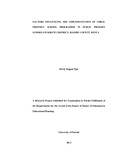| dc.description.abstract | The Child- Friendly School programme in Kenya was contextually located within a broader context of relatively new developments in the nation’s education sector, which seeks to accelerate achievements of EFA goals and the education targets as outlined in the Millennium Development Goals that effectively enhances quality learning for all children. Therefore, an assessment of factors influencing the implementation of Child-Friendly School programme in public primary schools in Kikuyu district was a big concern. The purpose of the study was to assess the factors influencing the implementation of Child – Friendly School programme in public primary schools in Kikuyu district, Kiambu County. It was guided by the following research objectives; to determine how schools’ classroom facilities affect the implementation of Child-Friendly School programme; to establish how schools sanitation facilities affect the implementation of Child-Friendly School programme; to establish the extent to which school community participation in school programme affect the implementation of Child-Friendly School programme and finally to examine how the school feeding programmes affect the implementation of Child-Friendly School programme. The study adopted the systems theory by Ludwig Von Bertalanffy. The study adopted the descriptive survey research design. The target population consisted of all 57 public primary schools. Stratified sampling was used to sample 17 schools based on zonal strata. The sample size comprised of 17 head teachers, 131 teachers and 197 class eight pupils. Data was collected using questionnaires and an observation check list. Collected data was tabulated in percentages and frequencies and presented using tables, pie-charts and bar graphs. The study findings showed that the classroom and sanitation facilities of the schools affect the implementation of Child-Friendly School programme in public primary schools. There was also evidence of school community participation in the majority of the schools indicating high parental interest and support in the learning of the pupils. School feeding programmes were not evident in most schools and pupils in those schools wasted a lot of time meant for their studies going home for lunch hence leading to low learner achievements, poor retentions rates, low completion rates and eventually poor transition to secondary school. The study recommends for forums by educationists on creation of awareness on the importance of the quality education to learners and the school community. The study also recommends that educational policy-makers to come up with policies on measures to be used for provision, improvement and implementation of Child-Friendly School environment in the education sector. Finally, the research proposes further research to be carried out on investigation on factors underlying causes of drop-out pupils, an investigation why fire risks are one of the dangers to school, despite having many fire drills and an investigation on factors impending development of disability-friendly facilities in Kikuyu district. | en |

